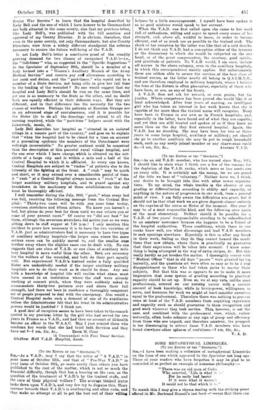SOME METAPHYSICAL LIMERICKS.
[To THE EDITOR or THE " SPECTATOR."] have been making a collection of metaphysical Limericks on the lines of one which appeared in the Spectator not long ago. Those of your readers who have forgotten it may be glad to be reminded of so perfect an example of nonsense philosophy:—
" There was an old man of Cadiz Who asserted, 'Life is what it For he early had learnt
If it were what it weren't It could not be that which it is.'4 To match this I may give a rhyme dealing with the striking proof offered in Mr. Bertrand Russell's last hook " ..efitys that there can he no such thing as a " state of motion," for the very good reason that you cannot be in two places at one and the same time. You must always be somewhere and not nowhere at any given instant. You cannot be in a state of transition, because transition, however rapid, merely means passing through a great number of given points. You can always be " caught oa the hop," so to speak :—
" There was an old man who said ' Motion, A state of, 's a comical notion.
It would seem to connote That a single " U "-Boat Could be at two points on the ocean.' "
I am indebted to a friend for the following version of Anaxagoras's famous formula of eternal change:—
" Said a maid with a tear and a sigh,
' At heart I detest rely= lid. It just means that our boys
Must be shorn of their joys In the wink of a changeful glad eye.' " As an alternative on the same theme I am offered :- " Susan said, ' I observe that the crux Of existence is perpetual flux.
So the dear lads should see That it isn't poor me, But this ruthless old maxim that " chucks." ' " Here, is a Learian version of the much-exploded proposition that Achilles could never catch the tortoise—a proposition that provided
so much puzzlement to the philosophers of Greece:—
"There was an old man who said What!
Do you really believe in that rot, That Achilles could never,.
Howe'er he endeavour, Catch up with the tortoise's trot? '
Finally, I understand that the brilliant author of A Spiritual G encid has put in circulation " amongst his private friends " a
number of theological Limericks. Unhappily, however, I have t.nly been able to secure one sample of these treasures for my collection :- "There was a young man who said Damn!
It grieves me to think that 1 am
Predestined to move In a circumscribed groove.
In fact—not a 'Bus, but a Tram.'"
Perhaps some of your readers may be able to oblige with further



































 Previous page
Previous page